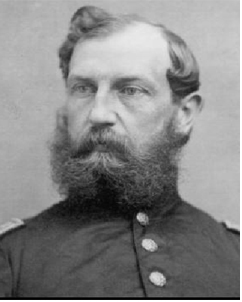Captain and Brevet Lieutenant Colonel
George T. Balch
 Captain Balch's most significant service to the US
Army Ordnance Corps clearly took place between September of 1863 and September of 1864, during which time he
served as the Army's de facto Chief of Ordnance by order of Secretary of War Edwin M. Stanton.
Captain Balch's most significant service to the US
Army Ordnance Corps clearly took place between September of 1863 and September of 1864, during which time he
served as the Army's de facto Chief of Ordnance by order of Secretary of War Edwin M. Stanton.
In September 1863, Brigadier General James Ripley was obliged to step down as Chief of Ordnance. Many problems had developed during his tenure, most notably his continuing refusal to utilize and promote newly developed weapons for the Army. President Lincoln and his Secretary of War, Edwin M. Stanton, disagreed about who should take his place. The Civil War had reached a critical stage in the aftermath of the Battle of Gettysburg, and it was imperative that the Army's Ordnance Department continues to provide the best possible support to the combat branches. Lincoln wanted to elevate COL George D. Ramsay, Commandant of the Washington Armory, to the post of Ordnance Chief. Mr. Stanton, strenuously resisted and sought to promote Captain Balch, then an assistant in the Ordnance office. Lincoln and Stanton compromised. Ramsay was promoted to brigadier general and given the title of Chief of Ordnance, but without his knowledge, Balch was placed in charge of the Office, Chief of Ordnance, and was given substantive control over its operations. Ramsay was a figurehead chief, while Captain Balch made virtually all-essential decisions. For a year, Balch, operated as Chief. Stanton's biographers Benjamin Thomas and Harold Hyman have stated that Balch, though nominally Ramsay's principal assistant, was actually Ramsay's "overseer." With Stanton and Ramsay, his two superiors, continually quarreling, Balch, a most capable officer, was caught in the middle of an impossible command situation. In light of this fact, the long-forgotten Captain Balch deserves great credit for having kept the Ordnance Department functioning smoothly and effectively at a critical juncture during the Civil War. He made certain that urgently needed weapons, munitions, and equipment were kept flowing to the front lines. He left the affairs of the Ordnance Department in such excellent shape when he departed for his next assignment that its accounts were the first to be settled after the Civil War ended.
In September 1864, Captain Balch was transferred to instructional duties at West Point for the academic year 1864-1865. He then was placed in charge of the Charleston, SC Arsenal, where he began the task of bringing that facility back into full operation following the destruction done to it at the end of the Civil War. He resigned from the Army in December 1865. Placed in an extremely awkward situation in the middle of the Civil War, Captain Balch performed his duties in an outstanding manner.
In later life, Balch was an official with the Erie Railroad, a firm that had previously suffered from mismanagement. As company auditor, he developed an accurate, exhaustive, and much-needed system of inventorying the company's property. His experience as an Army logistician was of great benefit in this connection. When the company went into receivership, he drew up a comprehensive inventory of its assets for its English bondholders, which was said to have been the most complete document of its kind ever written. This activity in turn led him to publish several technical volumes concerning the nature of railroad property, plants, right-of-way, and other related issues.
Toward the end of his life, while auditor of the New York City Board of Education, he devoted much effort to promoting patriotism in the children of the nation's public schools. A motto he drafted in this connection, "We give our heads and hearts to God and our country; one country, one language, one flag!" was adopted by a number of schools in many states. It was Captain Balch who proposed that flagpoles be erected on or in front of all the public schools in the nation, and he became nationally known for his work on this project.
Captain Balch's service to the Ordnance Department and his country during a most critical time in its history has never—because of its unusual nature--been properly recognized, and he is deserving of induction in to the Ordnance Hall of Fame.